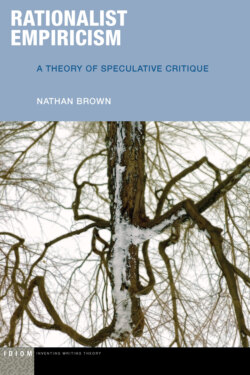Rationalist Empiricism

Реклама. ООО «ЛитРес», ИНН: 7719571260.
Оглавление
Nathan Brown. Rationalist Empiricism
Отрывок из книги
RATIONALIST EMPIRICISM
Jacques Lezra and Paul North, series editors
.....
Having begun to articulate an approach to rationalist empiricism by drawing together Bachelard’s and Althusser’s theories of scientific knowledge, we can now address some of the problems with the relatively thin realist epistemology put forward by Meillassoux in After Finitude. First of all, how can we square Meillassoux’s defense of the Cartesian distinction between primary and secondary qualities with the “non-Cartesian epistemology” formulated by Bachelard?26
We should bear in mind Bachelard’s stipulation that his “non-Cartesian philosophy complements Cartesian philosophy without contradicting it.”27 What he objects to in Cartesian epistemology is its fundamentally analytical method: the grounding of knowledge upon simple ideas according to the principle that “no construction is clear to the mind unless the mind knows how to take it apart.” According to Bachelard, “Descartes never pays heed to the reality of the complex, to the emergence of qualities in the whole not evident in the parts,” whereas “modern science begins with synthesis.”28 Epistemologically, he argues, modern science “relies for clarity on combining ideas rather than on trying to understand individual objects in isolation. In other words, instead of intrinsic clarity it relies on what I shall call operational clarity. Relations do not exemplify objects; objects exemplify relations.”29 Bachelard thus proposes a relational realism according to which
.....